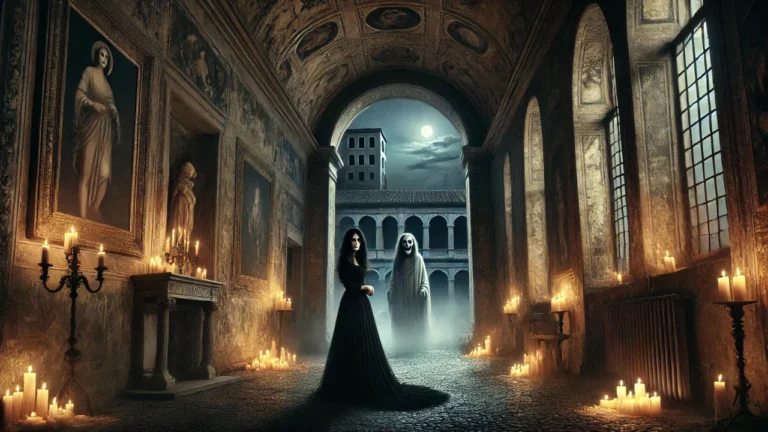The Clockmaker’s Apprentice
In the quiet town of Dunswell, nestled between rolling hills and a glimmering river, there stood an ancient clock shop. Its sign, painted with curling gold letters, read Tempus et Fatum—“Time and Fate.” The shop belonged to Master Nicola, a man as old and intricate as the mechanisms he mended. His hands were strong but delicate, able to coax the most stubborn of gears back into motion.
However, Nicola, for all his skill and renown, was a man of secrets so much so that whispers filled the marketplace that he could do more than repair clocks. Some even speculated that he could halt time itself; others claimed he could rewind it. But few dared to ask, for Nicola was not known for his patience with idle chatter.
When Nicola put up a sign seeking an apprentice, it was as though lightning struck the town. Every family with an ambitious child dreamed of placing them in the service of the great clockmaker. Yet, it was not the well-dressed sons of merchants nor the clever daughters of teachers who won his favour. Instead, Nicola chose a wiry boy named Eli, who had spent most of his days delivering bread and tinkering with discarded scraps of metal.
Eli was an odd sort, with a habit of staring too long at things—as though looking for secrets hidden in plain sight. When he entered the shop for the first time, he paused before a towering grandfather clock that ticked with an almost musical rhythm.
“Beautiful, isn’t it?” Nicola said, his voice as rich and measured as the clock’s chime.
Eli nodded. “Why does it sound different?”
Nicola raised an eyebrow, impressed. “Because it doesn’t just mark time—it tells a story. All clocks do. If you listen closely, they’ll tell you yours.”
Eli did not know what to make of this, but he nodded solemnly. From that day forward, his apprenticeship began.
Nicola was a strict but fair teacher. He taught Eli how to polish brass until it gleamed, how to assemble intricate cogs with precision, and, most importantly, how to listen. “Every clock has its own rhythm,” he explained. “Miss it, and you’ll never truly fix it.”
Eli worked tirelessly, his hands growing calloused but nimble. Over time, he learned the subtle art of understanding the language of timepieces. Some ticked with the urgency of a sprinter; others moved with the languor of a river.
Yet, there were things Nicola would not teach.
One afternoon, Eli discovered a locked cabinet in the workshop. It was heavy and ornate, carved with swirling patterns that seemed to shift in the light. When he asked about it, Nicola’s face darkened.
“Some knowledge is dangerous,” he said. “The cabinet stays closed.”
That night, curiosity gnawed at Eli. He had heard the townsfolk’s rumours, their tales of Nicola’s unnatural abilities. Did the cabinet hold the secret to turning back time? Could it undo mistakes, erase pain?
Eli’s fingers itched to know.
Months passed, and Eli grew restless. Though he loved the craft, he couldn’t shake the feeling that Nicola was holding something back. One stormy evening, when thunder rattled the windows, and the rain fell in torrents, Eli found himself alone in the workshop. Nicola had left for a rare visit to the town council, and the shop felt unusually quiet.
The cabinet seemed to call to him.
With trembling hands, Eli picked the lock. Inside, he found a clock unlike any he had seen. It was small, no larger than a pocket watch, but its face was mesmerizing—a swirling vortex of silver and black. Instead of numbers, it bore strange symbols that seemed to shimmer and shift.
As Eli reached for it, the workshop door creaked open.
Nicola stood in the doorway, rain dripping from his cloak. His face was a storm of its own.
“What have you done?” he thundered.
“I just wanted to know!” Eli cried. “You said clocks tell stories. What story does this one tell?”
For a long moment, Nicola said nothing. Then, with a heavy sigh, he closed the door and removed his wet cloak.
“This clock,” he said, placing it gently on the workbench, “does not tell stories. It writes them.”
Nicola explained that the clock, known as The Chronigator, was an artefact of great power. It allowed its user to alter the threads of time, to rewrite events as though editing a manuscript.
“But every change comes with a cost,” Nicola said. “Time is not meant to be tampered with.”
Eli’s mind raced. He thought of his mother, who had died of fever when he was just a boy. He thought of his little sister, who limped from a childhood accident. Could he fix their lives?
“Let me try,” Eli pleaded.
Nicola shook his head. “I’ve spent decades protecting this clock from those who would misuse it. Do not ask me to hand it over to a boy who barely understands the weight of his own actions.”
Eli felt a flare of anger. “You think I’m just a boy? I’ve worked hard for you. I’ve learned everything you taught me—and more! Maybe I understand more than you think.”
For the first time, Nicola looked at Eli not with frustration but with sorrow.
“You may know how to fix a clock,” he said softly, “but you do not yet understand how to live with the consequences of fixing time.”
Despite Nicola’s warning, Eli could not let the matter rest. One night, when Nicola was asleep, he crept into the workshop and took The Chronigator.
His hands trembled as he turned its delicate hands, focusing on the day his mother had fallen ill. The clock’s face glowed faintly, and the room seemed to ripple like water. When the light faded, Eli found himself standing in his childhood home.
His mother was alive, bustling about the kitchen. His sister, whole and happy, played on the floor. For a moment, Eli felt a surge of triumph. He had done it.
But as the days passed, strange things began to happen. Time itself seemed… off. The river near the town overflowed its banks, flooding fields and homes. Crops withered, and the townspeople grew fearful.
Desperate for help, Eli rushed to the shop and confessed what he had done. Nicola listened quietly.
Then, with a soft voice, he said, “The clock doesn’t just change time. It reshapes the threads of fate: when you pull one thread, others unravel, and you never know which.”
“Then how do I fix it?” Eli asked, panic rising.
Nicola handed him the clock. “You must go back and undo what you’ve done. Restore the story as it was meant to be.”
Eli hesitated. Could he really sacrifice his mother and sister’s happiness? He turned the hands of The Chronigator once more, tears streaming down his face.
When the light faded, he was back in the workshop. The world was as it had been: his mother gone, his sister limping, but time stable.
Nicola placed a hand on his shoulder. “You made the right choice.”
Eli nodded, though his heart ached. He now understood the weight of time’s stories—and the wisdom in letting them unfold as they were meant to.
From that day forward, Eli devoted himself to his craft with a new sense of purpose. He no longer sought to control time but to honour it. And as the years passed, the townsfolk began to whisper about him, just as they once had about Nicola.
For Eli had learned the most important lesson of all: that some stories are not ours to rewrite but to live.

Syeda Areeba Mashkoor is a passionate story writer with a vision. She is a talented storyteller with a deep love for literature and creative expression. Having excelled in academics and public speaking, she discovered her true passion in writing, leading her to pursue a BS in English. Her journey as a writer is fueled by the belief that words have the power to transform imagination into reality.
Areeba specializes in fables, moral tales, and fantasy, crafting stories that inspire and engage readers of all ages. Beyond writing, she finds solace in painting, meditation, and journaling, practices that have shaped her perspective and strengthened her creative voice. With dreams of becoming an internationally recognized writer, she continues to refine her craft, seeing storytelling as a limitless world of possibilities.







